27 start with L start with L
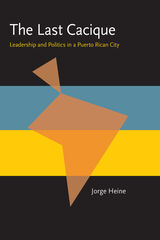
Based on years of intensive research, including unusually candid interviews with members of Puerto Rico's political elite, The Last Cacique offers the first in-depth study of local politics in Puerto Rico and one of the very few available for the Caribbean region.
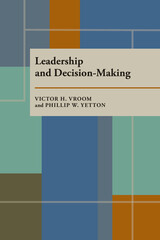
It has become a truism that “leadership depends upon the situation,” but few behavioral scientists have attempted to go beyond that statement to examine the specific ways in which leaders should and do vary their behavior with situational demands. Vroom and Yetton select a critical aspect of leadership style-the extent to which the leader encourages the participation of his subordinates in decision-making. They describe a normative model which shows the specific leadership style called for in different classes of situations. The model is expressed in terms of a “decision tree” and requires the leader to analyze the dimensions of the particular problem or decision with which he is confronted in order to determine how much and in what way to share his decision-making power with his subordinates.
Other chapters discuss how leaders behave in different situations. They look at differences in leadership styles, and what situations induce people to display autocratic or participative behavior.


Leadership and Values provides new material in two key areas. First, it is an in-depth study of the organization and administration of large-scale Chinese enterprises, with considerable detail on Chinese behavior in such settings. Second, the author constructs from the Chinese data a framework for the cross-cultural analysis of large-scale organizations. This framework identifies key variables that, when considered systematically, permit a clearer understanding of the role of cultural factors in organizational behavior and design.
The data for this study were gathered by participant-observer techniques at firms in Taiwan, and many of the findings are assumed to apply in large part to behavioral patterns on the mainland and in other areas of Chinese culture.
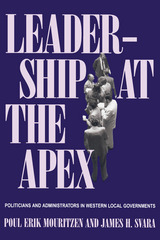
Although the relationship between elected officials and appointed executives has often been viewed as a struggle between master and servant—with disagreements as to which individuals occupy which roles—Poul Erik Mouritzen’s and James Svara’s comparison of city governments in fourteen countries reveals more interdependence and shared influence than conflict over control.
Mouritzen and Svara bring local government to the forefront, emphasizing the sophisticated level of city management in Australia, Belgium, Denmark, Finland, France, Ireland, Italy, the Netherlands, Norway, Portugal, Spain, Sweden, the United Kingdom, and the United States. Their findings lead to a revision of the general view concerning the boundaries of public administration. <I>Leadership at the Apex</I> illustrates in practical ways how the democratic control of government and professional administration can coexist without undermining the logic or integrity of each other.

Volume 6 of the Leadership Symposia—sponsored by the Department of Administrative Sciences and College of Business Administration at Southern Illinois University, Carbondale—charts the state of the field of leadership through a judicious mixture of established and emerging scholars.
The text is broken into four parts, with each part containing an Introduction by the editors. Part 1 consists of “Leadership and Managerial Behavior as Loosely Coupled Systems for Moving Beyond Establishment Views,” by the editors; “The Relevance of Some Studies of Managerial Work and Behavior to Leadership Research,” Rosemary Stewart; “Unstructured, Nonparticipant Observation and the Study of Leaders’ Interpersonal Contacts,” Robert S. Bussom, Lars L. Larson, and William M. Vicars; “Leaders on Line,” Michael M. Lombardo and Morgan W. McCall, Jr.; and “Various Paths Beyond Establishment Views,” Bernard Wilpert.
Part 2 contains “Multiplexed Supervision and Leadership,” Fred Dansereau, Jr., Joseph A. Alutto, Steven E. Markham, and MacDonald Dumas; “A Theory of Leadership Categorization,” Robert G. Lord, Roseanne J. Foti, and James S. Phillips; “Leadership Activation Theory,” John E. Sheridan, Jeffrey L. Kerr, and Michael A. Abelson; and “Intensity of Relation, Dyadic-Group Considerations, Cognitive Categorization, and Transformational Leadership,” Bernard M. Bass; “Strategies for Dealing with Different Processes in Different Contexts,” Ian Morley, “A Multiplexed Response to Bass and Morley,” Fred Dansereau, Jr., Joseph A. Alutto, Steven E. Markham, and MacDonald Dumas; and “Properly Categorizing the Commentary,” Roseanne J. Foti, Robert G. Lord, and James S. Phillips.
Part 3 contains “SYMLOG and Leadership Theory,” Robert F. Bales and Daniel J. Isenberg; “Toward a Macro-Oriented Model of Leadership: An Odyssey,” James G. Hunt and Richard N. Osborn; and “Toward a Paradigm Shift in the Study of Leadership,” Henry J. Tosi, Jr.
Essays in part 4 are “If You’re Not Serving Bill and Barbara, Then You’re Not Serving Leadership,” Henry Mintzberg; “Beyond Establishment Leadership Views: An Epilog,” by the editors; “Leadership Research and the European Connection: An Epilog,” Dian-Marie Hosking and James G. Hunt; and “Conclusion: The Leadership-Management Controversy Revisited,” Schriesheim, Hunt, and Sekaran.
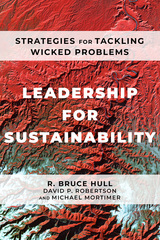
Leadership for Sustainability gives readers perspective and skills for promoting creative and collaborative solutions. Blending systems thinking approaches with leadership techniques, it offers dozens of strategies and specific practices that build on the foundation of three main skills: connecting, collaborating, and adapting. Inspiring case studies show how the book’s strategies and principles can be applied to diverse situations:
- Coordinating the activities of widely dispersed individuals and groups who may not even know they are connected, illustrated by the work of urban planners, local businesses, citizens, and other stakeholders advancing ambitious climate action goals via a Community Energy Plan in Arlington County, Virginia
- Collaborating with diverse stakeholders to span boundaries despite their differences of opinion, expertise, and culture, as illustrated by the bold actions of a social entrepreneur who transformed the global food service industry with the “plant-forward” movement
- Adapting to continuous change and confounding uncertainty, as a small nonprofit organization mobilizes partners to tackle poverty, water scarcity, sanitation, and climate change in rural India

Leadership from the Margins describes and analyzes the unique leadership styles and challenges facing the women leaders of CSOs in Argentina, Chile, and El Salvador. Based on ethnographic research, Serena Cosgrove's analysis offers a nuanced account of the distinct struggles facing women, and how differences of class, political ideology, and ethnicity have informed their outlook and organizing strategies. Using a gendered lens, she reveals the power and potential of women's leadership to impact the direction of local, regional, and global development agendas.
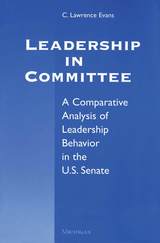
How does the leadership of a Senate committee influence the outcome of bills? In Leadership in Committee C. Lawrence Evans delves into the behavior of legislative leaders and the effects of what they do, how their tactics vary, and why. Using evidence gleaned from personal interviews with a large number of U.S. senators and Senate staff, the author compares the leadership styles of eight committee chairs and ranking minority members in the U.S. Senate. The result is a significant contribution to the literature on American politics, the first book-length, comparative analysis of legislative leadership behavior in the modern Senate.
". . . .this book is highly recommended reading for those interested in both legislative politics and political leadership. . . .Leadership in Committee establishes Evans as one of the handful of political scientists who have done justice to the subtleties of politics in the modern Senate."
---Randall Strahan, Journal of Politics
"Larry Evans has significantly influenced my own work over the years, and Leadership in Committee is one reason why. It is a model of great scholarship, the best work on committee leadership ever written. It has the discriminatory sense of context that appears only when the author truly knows his subject. It is theoretical without being reductionist or vacuously abstract. Its principal claims are general yet sufficiently concrete to be testable, and Evans provides systematic, comparative evidence to support (or qualify) each of them. Larger issues of agenda-setting, institutional structure, partisanship, anticipated reactions, participation, committee-floor bargaining, and strategic action of various kinds receive thoughtful and insightful examination. And the book is simply a terrific read. Too long in coming, the publication of Leadership in Committee in paperback ought to spark a well-deserved revival of interest in this work."
---Richard L. Hall, University of Michigan
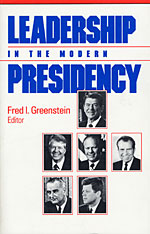
In presidential election years the leadership qualities of occupants of the Oval Office become yardsticks for aspiring candidates. What profile of qualities, both positive and negative, helps explain the performance of chief executives? In this book about the White House, nine eminent political scientists and historians present their assessments of the leadership styles and organizational talents of presidents from Franklin D. Roosevelt to Ronald Reagan. Filled with anecdote and insight, this is an unprecedented opportunity to observe how the running of the office of President has been changed, subtly and not so subtly, by the management and personal styles of the various incumbents within their historical contexts.
The book vividly depicts each president. There is Roosevelt, “a real artist in government”; Truman, a strong executive who always managed to appear weak; Eisenhower, who cultivated the image of being “above the fray” of politics but was actually fully occupied with getting political results; Kennedy, who successfully projected the symbolic grandeur of his office; Johnson, a figure from classical tragedy; Nixon, who preferred a corporate to a political mode of operation; Ford, who placed healing the nation’s wounds from Vietnam and Watergate above his personal political future; Carter, whose fall was as stunning as his rise was meteoric. The chapter on Reagan is an impassioned encomium of the president as a folk philosopher that is bound to be controversial.
These accounts of leadership by modern presidents are acute studies of how the presidency has become the first among equals in our tripartite system of government. This book will be important to political scientists, historians, and government officials, and the liveliness of its presentation and the quotidian impact of the men it describes will make it attractive to everyone interested in how we are governed and who is doing the governing.

Simon McDonald argues that we should reflect on the nature and strategies of leadership before entering a leadership role, and we should look to examples of others to help us in shaping our own approaches.
Over nearly four decades in Her Majesty's Diplomatic Service, McDonald worked for four permanent under-secretaries and a dozen senior ambassadors before becoming a permanent under-secretary himself and leading the Service—which has over 14,000 staff members in 270 countries—for five years. He also worked directly for six foreign secretaries and under five prime ministers. Observing these people undertaking such important and difficult work, McDonald saw the behaviors which helped them achieve their objectives, as well as those which hindered them.
In this book, McDonald synthesizes the skills he’s learned through his many years working in diplomacy, offering an insightful contribution amid heightening debates over the leadership of the United Kingdom. Considering the future of British leadership, he makes a case for the reform of the monarchy, the cabinet, civil service, and, in particular, the House of Lords, of which he has been a member since 2021.
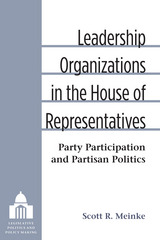


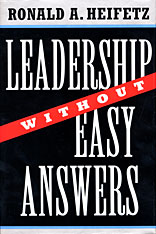
The economy uncertain, education in decline, cities under siege, crime and poverty spiraling upward, international relations roiling: we look to leaders for solutions, and when they don’t deliver, we simply add their failure to our list of woes. In doing do, we do them and ourselves a grave disservice. We are indeed facing an unprecedented crisis of leadership, Ronald Heifetz avows, but it stems as much from our demands and expectations as from any leader’s inability to meet them. His book gets at both of these problems, offering a practical approach to leadership for those who lead as well as those who look to them for answers. Fitting the theory and practice of leadership to our extraordinary times, the book promotes a new social contract, a revitalization of our civic life just when we most need it.
Drawing on a dozen years of research among managers, officers, and politicians in the public realm and the private sector, among the nonprofits, and in teaching, Heifetz presents clear, concrete prescriptions for anyone who needs to take the lead in almost any situation, under almost any organizational conditions, no matter who is in charge, His strategy applies not only to people at the top but also to those who must lead without authority—activists as well as presidents, managers as well as workers on the front line.



Using an engaging case study approach, Leading for Tomorrow provides readers with real-world examples that will help them reflect on their own management and communication styles. It also shows newly minted administrators how they can follow best practices while still developing a style of leadership that is authentic and uniquely their own.
The book’s case studies offer practical solutions for how to deal with emerging trends and persistent problems in the field of higher education, from decreasing state funding to political controversies on campus. Leading for Tomorrow gives readers the tools they need to get the best out of their team, manage conflicts, support student success, and instill a campus culture of innovation that will meet tomorrow’s challenges.


Bringing together graduates of a women's leadership certificate program at Rutgers University's Institute for Women's Leadership, these essays provide a contrasting picture to assumptions about the current death of feminism, the rise of selfishness and individualism, and the disaffected Millennium Generation. Reflecting on a critical juncture in their lives, the years during college and the beginning of careers or graduate studies, the contributors' voices demonstrate the ways that diverse, young, educated women in the United States are embodying and formulating new models of leadership, at the same time as they are finding their own professional paths, ways of being, and places in the world. They reflect on controversial issues such as gay marriage, gender, racial profiling, war, immigration, poverty, urban education, and health care reform in a post-9/11 era.
Leading the Way introduces readers to young women who are being prepared and empowered to assume leadership roles with men in all public arenas, and to accept equal responsibility for making positive social change in the twenty-first century.

An exploration of how plant behavior and adaptation offer valuable insights for human thriving.
We know that plants are important. They maintain the atmosphere by absorbing carbon dioxide and producing oxygen. They nourish other living organisms and supply psychological benefits to humans as well, improving our moods and beautifying the landscape around us. But plants don’t just passively provide. They also take action.
Beronda L. Montgomery explores the vigorous, creative lives of organisms often treated as static and predictable. In fact, plants are masters of adaptation. They “know” what and who they are, and they use this knowledge to make a way in the world. Plants experience a kind of sensation that does not require eyes or ears. They distinguish kin, friend, and foe, and they are able to respond to ecological competition despite lacking the capacity of fight-or-flight. Plants are even capable of transformative behaviors that allow them to maximize their chances of survival in a dynamic and sometimes unfriendly environment.
Lessons from Plants enters into the depth of botanic experience and shows how we might improve human society by better appreciating not just what plants give us but also how they achieve their own purposes. What would it mean to learn from these organisms, to become more aware of our environments and to adapt to our own worlds by calling on perception and awareness? Montgomery’s meditative study puts before us a question with the power to reframe the way we live: What would a plant do?
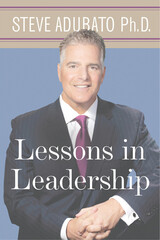

Most scholars and pundits today view Franklin Delano Roosevelt and John F. Kennedy as aggressive liberal leaders, while viewing Schlesinger’s famous histories of their presidencies as celebrations of their steadfast progressive leadership. A more careful reading of Schlesinger’s work demonstrates that he preferred an ironic political outlook emphasizing the virtues of restraint, patience, and discipline. For Schlesinger, Roosevelt and Kennedy were liberal heroes and models as much because they respected the constraints on their power and ideals as because they tested traditional institutions and redefined the boundaries of presidential power.
Aggressive liberalism involves the use of inspirational rhetoric and cunning political tactics to expand civil liberties and insure economic equality. Schlesinger’s emphasis on the crucial role that irony has played and should play in liberalism poses a challenge to the aggressive liberalism advocated by liberal activists, political thinkers, and pundits. That his counsel was grounded in conservative insights as well as liberal values makes it accessible to leaders across the political spectrum.


His memoir, interspersed with personal wisdom gleaned over more than six decades of service and leadership, encapsulates Sandy’s shrewd yet optimistic view of the public university as an institution. At every stage in his life—in the U.S. Navy during World War II, while practicing law or teaching, and in leadership positions at Chicago’s Field Museum and the University of Iowa— Sandy relied on his principles of open disclosure, inclusiveness, and respect for differences to guide him on issues that matter.
This chronicle of Sandy’s experiences throughout his life shows us the evolution both of the University of Iowa and of the nation writ large. More importantly, this book gives us a lens through which to examine our present situation, whether debating free speech on campus, the role of the arts and humanities in civil society, or the importance of funding for educational and cultural institutions.
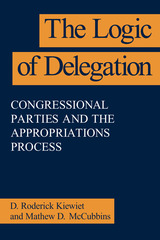
In The Logic of Delegation, however, D. Roderick Kiewiet and Mathew D. McCubbins persuasively argue that political scientists have paid far too much attention to what congressional parties can't do. The authors draw on economic and management theory to demonstrate that the effectiveness of delegation is determined not by how much authority is delegated but rather by how well it is delegated.
In the context of the appropriations process, the authors show how congressional parties employ committees, subcommittees, and executive agencies to accomplish policy goals. This innovative study will force a complete rethinking of classic issues in American politics: the "autonomy" of congressional committees; the reality of runaway federal bureaucracy; and the supposed dominance of the presidency in legislative-executive relations.

READERS
Browse our collection.
PUBLISHERS
See BiblioVault's publisher services.
STUDENT SERVICES
Files for college accessibility offices.
UChicago Accessibility Resources
home | accessibility | search | about | contact us
BiblioVault ® 2001 - 2024
The University of Chicago Press









